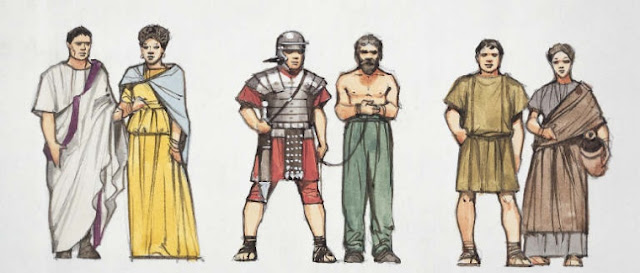Rome owed her rise to the fighting qualities of her peasant-proprietors. The traditional picture of the earliest republic and the struggle between the orders clearly show that then already the normal Roman was a landowner. It is true that the distress of the plebeians indicates that their plots must often have been very small, and it is also true that, according to modern archaeological theories, there had probably existed, before recorded history begins, in Latium generally, as in Etruria, a system of villeinage, i.e. that the bulk of the population had been semi-free tenants working on large estates owned by great landlords. But what we know of the economic side of the struggle between the orders is sufficient to show that this state of affairs was over when that struggle took place. One of the chief complaints of the plebeians is that they are forced to serve as soldiers and that on their return from a campaign they find their land ruined through lack of attention, or worse still actually devastated by the enemy, and that they are thus forced to borrow from the larger landowners in order to begin again. This is not the sort of complaint which would be made by a semi-free tenant, whose lord would have the responsibility for setting him up again. The cry too is that the patricians monopolise the advantages of the public lands instead of dividing them up among the poor plebeians, which again shows that the plebeian is capable of holding land and regards such ownership as his normal condition. The "Servian" constitution (whatever be the date that should be assigned to it) also indicates that the normal Roman is a landowner, for its "tribes" are divisions of the land, and probably only landowners are originally enrolled –a procedure which would not have been accepted had there been a great number of landless men, for the arrangement is clearly intended to include the bulk of the population.
If the normal citizen was a small landowner we must not imagine that the estates of the aristocracy were very great either. The tradition of the patricians who had to be called from the plough to lead the armies of the republic probably represents the truth. Rome was a poor and weak state from the expulsion of the kings until at least the time of the capture of Veii (traditional date 396 B.C.), her first great conquest of a foreign people. The earlier part of the struggle between the orders took place during this period of weakness and the main plebeian victory (the Licinio-Sextian laws of 367) was won very early in the period of expansion. The economic provisions among these laws show that Rome was already beginning to go along the disastrous path of large estates and slave labour. One law limited the amount of public land which could be occupied by any individual to 500 iugera, and another laid down that landlords must employ a certain proportion of free labourers. But these measures themselves, though they were not strictly enforced, at any rate after the first few years, must have done something towards remedying the evils at which they were aimed, and still more was done to help the peasants by the use which Rome made of her conquests. After the capture of Veii the city was razed to the ground and her territory divided among the citizens of Rome in equal lots, the plebeians having their fair share, and subsequently Rome made many "assignations" of conquered territory to individuals in addiction to sending out colonies, which, besides their military function, served the purpose of providing land (in very small lots generally) for her increasing body of citizens.
